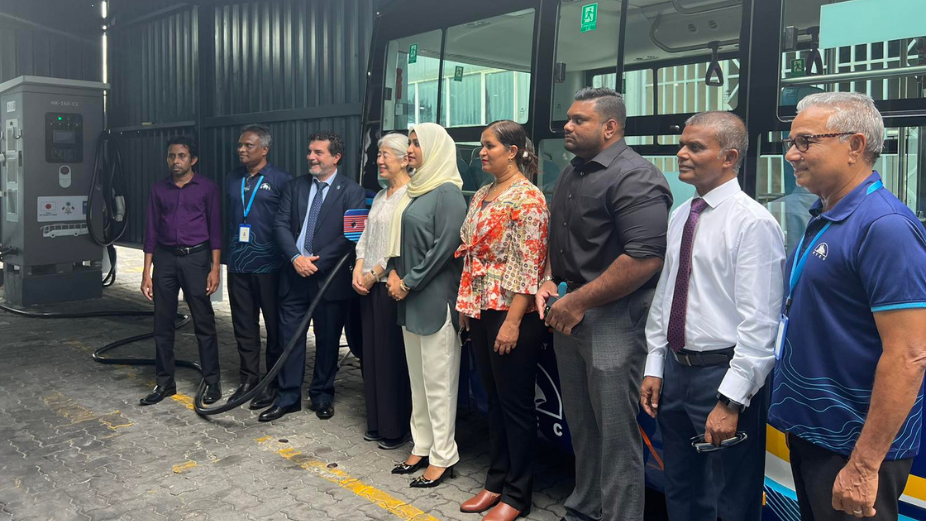The Ministry of Transport and Civil Aviation, supported by the United Nations Development Programme (UNDP) in the Maldives, with funding from the Government of Japan have jointly inaugurated the charging stations for the electric vehicle (EV) minibuses for use in public transport in the Greater Male’ Region. These charging stations are a product of the collaboration between the Ministry and UNDP under UNDP’s project,
“Leveraging nationally determined contributions (NDCs) to achieve Net Zero Emissions and Climate-Resilient Development, in response to the climate emergency” or the Climate Promise Project.
41% of the resident population lives in Male’. With its rapid growth, urbanization and population increase, reliable mobility is an essential service that catalyzes its economic and social growth. To meet these demands, the city has seen exponential growth in the number of conventional vehicles being imported and operated. This has also resulted in a clear increase in carbon emissions and poor ambient air quality in the region. The high density of vehicles has also resulted in the transport sector being listed as the second largest emitter of greenhouse gas (GHG) emissions in the country, accounting for 25% of total emissions in 2015.
With the generous support of the Government of Japan, this component of the Climate Promise project comprised of piloting charging stations for the electric mini public transport in the Greater Maale Region which included the procurement and installation of five charging stations and an array of solar panels that would produce the renewable energy to power the charging stations and offset its carbon footprint. This project is a first of its kind in the Maldives and hopes to build on this foundation to expand the electric fleet of vehicles in the public transport service.
This project resonates with the policies and initiatives of both the government and UNDP to bring together strong and effective partners and align climate change mitigation and development. The introduction of sustainable forms of transport such as electric vehicles backed by renewable energy is a key goal of the Maldives government. The Maldives has also committed to achieving net-zero emissions by 2030 as part of its commitments under the Paris Agreement. The inaugural event marks a milestone in mainstreaming green transport in the country and establishes the proof of concept upon which further expansion and investment would be possible.
Speaking at the event, Minister of Transport and Civil Aviation, Her Excellency Aishath Nahula said, “The completion of this project is a crucial event in our efforts to fulfil the goals of net zero emissions by 2030 and our responsibilities towards a greener and sustainable environment.”
The Climate Promise is UNDP’s response to climate change and has agreed to Climate Promise work plans with over 120 countries and territories making it the world’s largest offer of support for the enhancement of countries’ climate pledges. Tackling the climate crisis requires all countries to make bold pledges under the Paris Agreement, or NDCs, to reduce emissions of the greenhouse gases that cause global warming and strengthen adaptation to its impacts. The Climate Promise is UNDP’s commitment to ensure that any country wishing to increase the ambition of its national climate pledge is able to do so. UNDP is now scaling up its support for countries to turn their NDC targets into concrete action while continuing to push for greater ambition. Leveraging the NDCs as an umbrella, UNDP is bringing together its extensive infrastructure, networks and breadth of substantive offers to provide comprehensive support on NDC implementation.
UNDP Resident Representative in the Maldives, Enrico Gaveglia highlighted that the Climate Promise project has the potential to shape a future where the toughest challenges of the climate crisis are addressed through low-emissions and greener development pathways and that it has created opportunities for achieving the NDCs through the sustainable green transition of key emitting sectors.



















